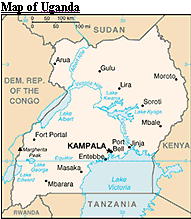 |
1. About Us 2. About Asayo (Sarah Asayo's History) 3. About Uganda Asayo's Wish is a registered US Charity with a mandate to educate, inspire, equip and facilitate people of all ages to challenge them to take notice of the 1.2 billion children at risk due to poverty, homelessness, child labor, slavery, sexual exploitation, aids and plagues, and war. In partnership with proven, seasoned organizations we fight to save dying children by sponsoring orphans; building orphanages and schools; developing micro-enterprises; advocacy; prayer; and arranging visitations for people to see first-hand the desperate situation that many of our world's children live in, and to help at an orphanage or other mercy project. Asayo's Wish was conceived to meet the need for a strategy to connect thousands of people who have a heart for 'children at risk' to the ground-level organizations who are actually doing the work - running orphanages and schools, rescuing children from slavery, feeding the poor. Many times, people have a desire to do something to help needy children, but have no idea how to go about it. Asayo's Wish provides the compassionate with step-by-step directions on how to gather those in their sphere of influence and, together, do something life-saving and life-changing! |
/IMG_0245.jpg) |
Asayo's Wish is structured in
such a way that 100% of all donations for children's homes or projects
go entirely to the designated project. This is possible
because we have businessmen and individual sponsors that specifically
fund the administrative costs, staff and overhead, so that every
dollar that is intended to help a child at risk can go directly
to the need. We can issue tax receipts for all donations About
Asayo When the plight of the children and women of northern Uganda came to my attention, I tried to look away. But I could not. I was deeply affected because I grew up in northern Uganda. Kaberamaido was my native village. I was a child there, and these are my people.
Climate: Generally warm throughout the year although nights and areas at higher altitudes can be cool. March to May and September to November are rainy seasons. The dry seasons are between December and February and June to August with the north of the country substantially drier than the south
Uganda was the only sub-Saharan African country to have subdued a major HIV/AIDS epidemic. UNAIDS reported that adult HIV rates continued to fall -- from 8.3% at the end of 1999 to 5% at the end of 2001, to 4.1% in 2003. An estimated 880,000 children were orphaned by AIDS by the end of 2002. Violence kept about 1.6-2 million Ugandans internally displaced, including at least 50,000 who were newly uprooted that year. About 20,000 Ugandans were refugees, with around 10,000 in Democratic Republic of the Congo, 5,000 in Sudan and 5,000 in Kenya. Uganda was host to approximately 175,000 refugees at the end of 2001. About 150,000 were from Sudan, with smaller numbers from Rwanda, Democratic Republic of the Congo and Somalia. The Lord's Resistance Army (LRA), which has waged a war in northern Uganda since 1987, wants to overthrow the government and rule Uganda by the biblical Ten Commandments. It aims villagers and kidnaps children to use as sex slaves and soldiers During the insurgencies the rebels abducted hundreds of children, used them as pack animals and systematically raped many of them. Many of the children are now HIV positive or have AIDS, some were so badly beaten and/or raped that they have been scarred for life both mentally and physically. Consequently some of the girls have been left with babies (even though they are still children themselves) and they have no means of supporting themselves or the babies. A number of children have been fortunate enough to find living family members. But there are those who have become street children. These street children are currently in the most desperate need of help. |
|
Asayo's
Wish Foundation© 2006 All Rights Reserved Designed by Neros Productions |

/IMG_0342.jpg)
